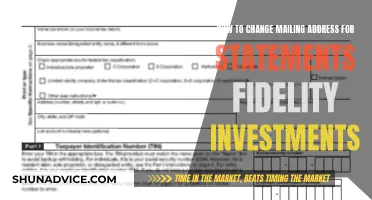
Changing investment funds is a difficult decision that requires careful consideration of various factors. While it is generally advised to avoid frequent changes, there are specific circumstances that warrant a shift in investment strategies. One key consideration is the performance of your current investments relative to your expectations and goals. It is essential to analyse whether your financial needs and circumstances have changed, such as a change in your job, income, or family situation. Additionally, evaluating your risk tolerance and investment horizon is crucial. If your timeline changes, such as nearing retirement, you may need to adjust your investment strategy accordingly. Significant life events, such as retirement, inheritance, or divorce, can also trigger a review of your investment portfolio. It is recommended to consult a financial advisor to discuss your specific situation and determine the appropriate investment approach.
| Characteristics | Values |
|---|---|
| Financial needs/circumstances changed | Changes in financial goals, significant life events, job changes, salary changes, marriage, divorce, tax situation, type of account |
| Investment horizon or risk tolerance changed | Shorter investment horizon = less risky investments; horizon >10 years = higher-risk investments; horizon between 2-10 years = mix of stocks and conservative investments; horizon <2 years = income-generating investments |
| Underperforming investments | Compare investment portfolio to benchmarks for context |
| Outperforming investments | Consult a financial advisor |
| Changes in funds | Changes in fund's manager, size, investment strategy, and composition |
| Returns | Do not chase returns; avoid selling low and buying high |
| Life changes | Retirement, inheritance, divorce, death, job changes, salary changes, large purchases |
| Market conditions | Current valuation of the stock market, whether the market is cheap or expensive by historical standards |
What You'll Learn

When your financial goals change
Financial planning is not a linear process. As your life progresses, your financial goals will evolve, and you will need to re-evaluate your investment strategies. Here are some key considerations for when your financial goals change:
Risk Tolerance
Your financial goals will often involve estimating your risk tolerance. For example, if you are saving for retirement, you may need to make more aggressive investments early on. In contrast, if you are saving for a short-term goal, you may need to take a risk-averse approach to avoid sudden losses. As your financial goals change, reassess your risk tolerance and adjust your investment strategy accordingly.
Time Horizon
Different financial goals have different time horizons. Long-term goals provide more time to ride out market volatility, allowing you to take on more risky investments. On the other hand, short-term goals require easy access to funds and relative stability of capital, influencing the types of investments you choose. When your financial goals change, consider the new time horizon and adjust your investments accordingly.
Market Conditions
When you change your financial goals, you may also need to adjust your investment strategies based on current market conditions. During periods of market instability, investors often focus on relatively stable investment options to safeguard their portfolios. Keep an eye on market conditions and be prepared to make adjustments to mitigate risks and capitalise on new opportunities.
Diversification
Financial goals determine how much an investor needs to spread out their investments. If you are comfortable with more risk, you may invest more heavily in specific sectors. On the other hand, if you are risk-averse, you may prefer to invest in stocks from various industries and countries to diversify your portfolio. As your financial goals change, reassess your risk appetite and adjust your diversification strategy.
Life Events
Major life events, such as changing jobs, getting a raise, having a child, getting married or divorced, can impact your financial goals and investment strategies. These events can change your income, expenses, and overall financial situation, requiring you to re-evaluate your investments. Regularly assess the impact of life events on your financial goals and make adjustments to your investment strategies as needed.
Vanguard Funds: Minimum Investment Requirements and Options
You may want to see also

When you experience a major life event
Major life events can have a significant impact on your finances and investment strategies. These events can bring about financial challenges and opportunities, and it is essential to understand how they can reshape your financial situation. Here are some common major life events and how they might influence your investment funds:
Marriage and Partnerships
Marriage often involves merging finances and aligning spending habits, debts, savings, and investment goals. It is essential to establish financial unity and plan for both short-term and long-term financial goals. This includes creating a shared budget, aligning saving strategies, and setting mutual financial goals. Deciding whether to merge bank accounts, maintain separate accounts, or have a combination of both is an important consideration. Joint accounts can simplify household expense management, but open communication and trust are crucial. A prenuptial agreement can also be practical, especially when significant assets, debts, or children from previous relationships are involved.
Divorce
Divorce can be emotionally and financially challenging. It often involves dividing assets and liabilities acquired during the marriage, including property, savings, pensions, and debts. It is essential to understand your financial rights and obligations, as the division of assets can significantly impact your financial landscape, lifestyle, savings, and retirement plans. Creating a new budget and closing joint bank and credit accounts are crucial steps to prevent future financial entanglements.
Arrival of Children
The arrival of children introduces new expenses and long-term financial commitments, such as education and healthcare. It is essential to adjust your budget and investment plans to accommodate these costs. Consider setting up an education fund or a savings account for your child's future needs, such as education, a first car, or a deposit on a house. Reviewing and updating your insurance policies, including life insurance and health insurance, is also crucial to ensure your child's future financial security.
Retirement
Retirement is a pivotal life stage where your focus shifts from wealth accumulation to income distribution. As you approach retirement, it is essential to review your investment strategy, as your risk tolerance and investment time horizon may change. You may prefer more conservative investment strategies with a focus on income generation and capital preservation.
Job Changes and Income Changes
Changing jobs or receiving a raise can impact your investment strategy. It is important to re-evaluate your financial goals and investment portfolio when your financial circumstances change.
In summary, major life events can have a significant impact on your finances and investment funds. It is important to proactively plan for these events, regularly review and adjust your financial plans, and seek professional financial advice when needed to navigate these transitions successfully.
Best Vanguard Funds to Maximize Your 401(k) Returns
You may want to see also

When your risk tolerance changes
Risk tolerance is a key factor in determining when to change investment funds. It is defined by the U.S. Securities and Exchange Commission (SEC) as "an investor's ability and willingness to lose some or all of an investment in exchange for greater potential returns".
An investor's risk tolerance is not static and can change over time as their financial circumstances, goals, and risk appetite evolve. Here are some detailed instructions on when and how to adjust your investment strategy when your risk tolerance changes:
Review Your Risk Tolerance Regularly:
First, it's important to assess your risk tolerance periodically, typically once a year. This is because your risk tolerance is influenced by dynamic factors such as your age, financial situation, investment goals, and market conditions. By regularly reviewing your risk profile, you can ensure that your investment portfolio remains aligned with your current circumstances, goals, and risk appetite.
Understand Your Financial Ability to Take Risks:
Your financial ability to take risks is based on an objective assessment of your financial circumstances and goals. As your financial situation changes, so does your capacity to take risks. For example, if you've taken on new financial obligations, such as a mortgage or funding your child's education, you may have a lower risk capacity. Similarly, a financial windfall may increase your risk capacity.
Adjust Your Investment Portfolio:
Once you've reassessed your risk tolerance, it's important to adjust your investment portfolio accordingly. If your risk tolerance has decreased, consider shifting towards more conservative investments, such as high-quality corporate bonds, treasuries, or certificates of deposit (CDs). On the other hand, if your risk tolerance has increased, you may want to allocate a larger portion of your portfolio to stocks and riskier fixed-income investments, such as high-yield bonds.
Consider Your Time Horizon:
The time horizon for your investments plays a crucial role in determining your risk tolerance. If you have a long-term investment horizon, you generally have a higher risk capacity since you have more time to recover from potential losses. Conversely, if your investment goals are short-term, you may need to adopt a more conservative investment strategy to avoid taking on excessive risk.
Understand Your Investment Goals:
Your investment goals are a key factor in determining your risk tolerance. If you are investing for retirement or funding your child's education, you may have a lower risk tolerance and seek more conservative investments. On the other hand, if you are investing with disposable income or risk capital, you may be comfortable taking on more risk.
In conclusion, by regularly reviewing your risk tolerance and making adjustments to your investment portfolio, you can ensure that your investments remain aligned with your changing circumstances, goals, and risk appetite. This proactive approach can help you avoid unwanted outcomes and improve your chances of achieving your financial objectives.
Key Considerations for Investing in Algorithmic Trading Funds
You may want to see also

When your investments are underperforming
Understanding Underperformance:
Before making any decisions, it's important to understand why your investments are underperforming. Some common reasons include:
- Change in Fund Management: A change in fund manager or investment strategy can impact the performance of your investments. Each fund manager has their own approach to managing portfolios and selecting stocks, so a change may lead to restructuring and impact returns.
- Merger or Acquisition: The acquisition or merger of a fund can also affect performance. This often leads to changes in the fund management team and investment objectives, which may deter investors.
- Fund Management Style: Different management styles perform differently in varying market conditions. Aggressive strategies may perform well in a bull market but underperform in a bear market, while defensive styles are better suited for bear markets.
- Sector Performance: Sector-specific funds may underperform if the invested sector is out of favour, even if it has strong fundamentals.
- Expense Ratio: High expense ratios can eat into your returns. Every rupee spent on expenses reduces your return by an equal amount, so a small difference in expenses between funds can lead to significant differences in long-term returns.
What to Do When Your Investments Underperform:
- Monitor Performance Regularly: It's important to periodically review the performance of your investments. Compare their returns over the last 8-12 quarters with index performance and similar funds in the same category. This will help you identify consistent underperformance.
- Assess the Reasons: If you detect underperformance, try to identify the specific reasons behind it. This will help you decide on the appropriate course of action.
- Hold or Sell: If the underperformance is due to factors like fund management style or market conditions, and the fund has a good probability of delivering in the near future, you may consider holding on to it. However, if the fund has been a consistent underperformer for an extended period (e.g., 3-4 quarters or more), it may be best to consider selling and redeeming your investment.
- Seek Professional Advice: Consult with your investment advisor or consultant, as they can provide personalised guidance based on your portfolio and financial goals.
Remember, short-term volatility doesn't always require immediate action, especially if you're investing for long-term goals. However, staying informed and taking corrective action when necessary is essential to making the most of your investments.
Savings Strategy: Mutual Funds Investment Allocation
You may want to see also

When you're planning for retirement
Regularly Review Your Retirement Accounts
Avoid the "set it and forget it" mentality with your retirement accounts. It's crucial to keep tabs on your investments and ensure they align with your retirement goals. Review your accounts at least once a year and consider consulting a financial advisor for guidance.
Increase Your Contributions Over Time
As your career advances and your income grows, consider boosting your contributions to your retirement accounts. This can have a snowball effect and lead to a more substantial account balance by the time you retire. Take advantage of "catch-up" contributions if you're over 50 to maximize your savings.
Adjust Your Investment Allocations
As you get closer to retirement, review and adjust your investment allocations to match your changing risk tolerance and goals. Generally, scale back on stocks and increase bonds or cash equivalents to reduce risk as you approach retirement age. Consider seeking advice from a representative at your financial institution to discuss whether a switch to more conservative investments makes sense for your circumstances.
Reinvest Your Retirement Funds When Changing Jobs
If you change jobs, avoid cashing out your retirement savings from your employer-sponsored plan. Instead, consider rolling over your qualified plan balance to a traditional IRA or your new employer's plan. This will help you maintain your nest egg and avoid penalties and fees associated with early withdrawals.
Consider Major Life Events
Re-evaluate your investment strategy after significant life events such as changing jobs, getting a raise, having children, or experiencing marriage or divorce. These events may impact your financial needs and goals, requiring adjustments to your investment allocations.
Monitor the Performance of Your Investments
While short-term performance may not be a concern with a long investment horizon, it's wise to periodically assess the performance of your investments. Compare your investment portfolio to relevant benchmarks to contextualize their performance. Consult a financial advisor if you have concerns or want guidance on optimizing your investments.
Best Vanguard Funds for Your Roth IRA
You may want to see also
Frequently asked questions
It is generally advised not to make changes to your investment portfolio, but there are a few exceptions. One is when there has been a change in your investing goals' time horizons and, consequently, your risk tolerance. For example, if you have extended the number of years until retirement, you may be able to take on more risk. Alternatively, if you are retiring sooner than expected, you may need to put your money in lower-risk investments. Another exception is if there has been a major life event that means you will need to access your investments in the near future (around three years). This could include marriage, a family emergency, or nearing retirement.
Before changing investment funds, it is important to consider the potential impact on your returns and retirement balance. You should also consider your tax situation and the type of account in which the investment is stored, as these factors impact the potential tax impact of changing investment strategies.
ETFs are generally more tax-efficient and affordable than traditional mutual funds. They are also highly liquid as they are sold on the secondary market, meaning no assets need to be sold off to fund shareholder redemptions. ETFs are best suited for investors who want to employ a buy-and-hold strategy and trust that the market will generate positive returns over time.







